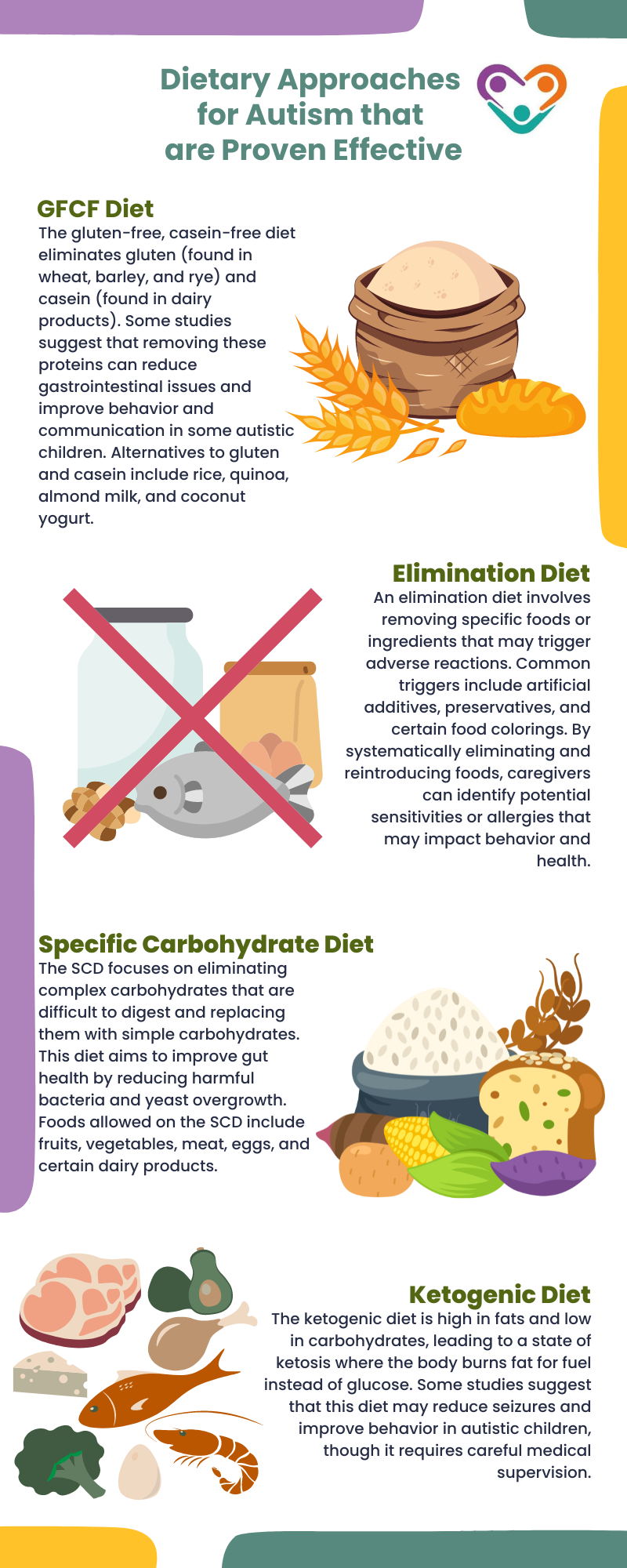A well-balanced and nutritious diet can have a profound impact on the overall health and well-being of autistic children. While there is no one-size-fits-all diet for autism, certain dietary approaches and nutritional considerations can help manage symptoms, improve behavior, and enhance quality of life.
The goal is to provide a diet that supports the unique needs of autistic children, focusing on nutrient-rich foods that promote optimal brain function and physical health.

Why a Balanced Diet Matters
For autistic children, a balanced diet can address various challenges such as gastrointestinal issues, food sensitivities, and nutrient deficiencies. Proper nutrition supports brain development, cognitive function, and emotional regulation.
A diet rich in vitamins, minerals, and essential fatty acids is crucial for maintaining energy levels, improving concentration, and managing stress and anxiety. To achieve a balanced diet for autistic children, parents and caregivers should remember these key nutritional considerations:
Essential Nutrients
Autistic children often have specific nutritional needs. Ensuring they receive adequate amounts of essential nutrients is vital. These include vitamins such as B6 and B12, minerals like magnesium and zinc, and omega-3 fatty acids. These nutrients play a significant role in brain function, neurotransmitter activity, and overall health.
Protein
Protein is essential for growth and development. It helps build and repair tissues, produce enzymes and hormones, and maintain a healthy immune system. Sources of high-quality protein include lean meats, poultry, fish, eggs, dairy products, legumes, nuts, and seeds.

Healthy Fats
Healthy fats, particularly omega-3 fatty acids, are crucial for brain health. These fats support cognitive function, reduce inflammation, and improve mood. Fatty fish such as salmon, mackerel, and sardines are excellent sources of omega-3s. Other sources include flaxseeds, chia seeds, walnuts, and hemp seeds.
Complex Carbohydrates
Complex carbohydrates provide a steady release of energy and help maintain stable blood sugar levels. Whole grains, fruits, vegetables, and legumes are excellent sources of complex carbohydrates. They also provide fiber, which aids in digestion and supports gut health.
Fiber
Adequate fiber intake is important for digestive health. Fiber helps regulate bowel movements, prevent constipation, and support a healthy gut microbiome. Fruits, vegetables, whole grains, and legumes are rich in fiber.
Hydration
Proper hydration is essential for overall health. Water is the best choice for hydration, but herbal teas and diluted fruit juices can also be included. Avoid sugary drinks and excessive caffeine, as they can contribute to hyperactivity and mood swings.
Dietary Approaches for Autism
Several dietary approaches have been explored for managing autism symptoms. While not all approaches work for every child, some have shown promising results. It’s important to consult with a healthcare professional before making significant dietary changes.
That said, here are some dietary approaches that have been proven effective:

How to Create a Personalized Diet Plan
Creating a personalized diet plan for an autistic child involves considering their individual preferences, daily routines, sensitivities, and nutritional needs. Here are some key steps to develop an effective diet plan:
- Consultation with Professionals: Working with healthcare professionals, such as pediatricians, dietitians, and nutritionists, is essential. They can provide guidance on nutritional requirements, identify potential deficiencies, and monitor the child’s progress.
- Incorporating Whole Foods: Focus on whole, unprocessed foods that provide essential nutrients. Fresh fruits and vegetables, lean proteins, whole grains, and healthy fats should form the foundation of the diet.
- Addressing Sensory Issues: Many autistic children have sensory sensitivities that affect their food choices. Introducing new foods gradually and in a sensory-friendly manner can help. Presenting foods in different textures, colors, and shapes may encourage acceptance.
- Maintaining a Food Diary: Keeping a food diary can help track the child’s dietary intake and identify any correlations between specific foods and behavior or health issues. This can provide valuable insights for adjusting the diet.
- Ensuring Nutritional Balance: Balancing macronutrients (proteins, fats, and carbohydrates) and micronutrients (vitamins and minerals) is crucial. Variety in the diet ensures a wide range of nutrients. For example, incorporating a mix of lean meats, fish, eggs, legumes, nuts, seeds, fruits, vegetables, and whole grains can provide a well-rounded nutritional profile.
Sample Diet Chart for Autistic Children
While each child’s needs are unique, the following sample diet chart provides a general framework that can be adjusted based on individual preferences and requirements.
For breakfast, you want to include scrambled eggs with spinach and tomatoes, a slice of whole grain toast with avocado, a serving of fresh fruit, such as berries or a banana, and a glass of almond milk or water.
For a mid-morning snack, a small handful of nuts, such as almonds or walnuts, and a piece of fruit, like an apple or pear, will do.
For lunch, you can go for grilled chicken or fish with a side of quinoa or brown rice, steamed vegetables, such as broccoli, carrots, and peas, a mixed green salad with olive oil and lemon dressing, and a glass of water or herbal tea
And for dinner, baked salmon or lean meat with sweet potatoes, roasted vegetables, such as bell peppers, zucchini, and asparagus, a side of mixed greens with a vinaigrette dressing, and a glass of water or diluted fruit juice is recommended.
Supplements and Additional Considerations
In some cases, dietary supplements may be necessary to address specific nutrient deficiencies. It’s important to consult with healthcare professionals before introducing supplements.
Some of the common supplements that may benefit autistic children include:
- Omega-3 Fatty Acids: These essential fats support brain health and cognitive function. Fish oil supplements are a popular source of omega-3s.
- Probiotics: Probiotics can help maintain a healthy gut microbiome, which is linked to improved digestion and immune function. Probiotic supplements or foods like yogurt and kefir can be beneficial.
- Vitamin D: Vitamin D is important for bone health and immune function. Sun exposure and dietary sources like fortified foods and supplements can help maintain adequate levels.
- Magnesium: Magnesium supports muscle and nerve function, as well as energy production. Foods rich in magnesium include leafy greens, nuts, seeds, and whole grains. Magnesium supplements can also be considered.
- B Vitamins: B vitamins are essential for energy production, brain function, and overall health. Foods rich in B vitamins include whole grains, lean meats, eggs, dairy products, and leafy greens. B vitamin supplements may be recommended if deficiencies are detected.
The Bottom Line
A well-balanced and personalized diet can significantly impact the health and well-being of autistic children. By focusing on essential nutrients, addressing individual preferences and sensitivities, and working closely with healthcare professionals, caregivers can develop a diet plan that supports optimal brain function, physical health, and overall quality of life.
While dietary approaches may vary, the goal remains the same: to provide a nutritious and enjoyable eating experience that meets the unique needs of each autistic child.
Suppose you need further guidance on developing personalized dietary plans. In that case, you can benefit from an ABA therapy program in New York, Indiana, New Jersey, Georgia, and Florida from Golden Care Therapy. For more information or to schedule a consultation, please visit our website or contact us to schedule an appointment.
Sources:
https://www.lybrate.com/topic/autism-diet
https://iyurved.com/blogs/essentialnutrients/a-healthy-diet-plan-for-autism
https://www.autismayurvedam.com/basics/diet-chart-for-autistic-kids
https://www.1specialplace.com/2023/07/04/diet-chart-for-autistic-children


